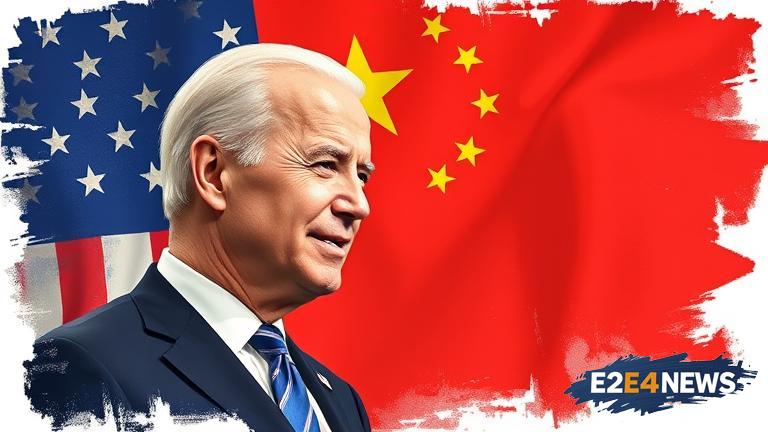The Biden administration has been criticized for its inability to stop China’s economic rise, despite efforts to counter its growing influence. China has continued to expand its economic reach, investing heavily in emerging markets and technologies. The country’s Belt and Road Initiative, a massive infrastructure development project, has been particularly successful in spreading Chinese influence across the globe. The Biden administration has attempted to counter this influence through various means, including the formation of the Quadrilateral Security Dialogue, a strategic partnership between the US, Australia, India, and Japan. However, these efforts have been hindered by a lack of cohesion and coordination among the partner nations. Furthermore, the US has struggled to compete with China’s economic might, particularly in the areas of technology and manufacturing. China’s state-led economic model has allowed it to invest heavily in key sectors, such as renewable energy and artificial intelligence, giving it a significant advantage over the US. The Biden administration has also been criticized for its handling of trade relations with China, with many arguing that it has been too soft on the country. The US has imposed tariffs on Chinese goods, but these have had limited impact on China’s economic growth. In fact, China’s economy has continued to grow at a rapid pace, with the country becoming an increasingly important player in global trade. The Biden administration has also faced challenges in its efforts to promote American businesses and industries, particularly in the areas of technology and manufacturing. Many US companies have struggled to compete with their Chinese counterparts, which have been able to take advantage of China’s large and growing market. The US has also been criticized for its lack of investment in key areas, such as infrastructure and education, which has hindered its ability to compete with China. Despite these challenges, the Biden administration has continued to emphasize the importance of countering China’s economic influence. The administration has argued that China’s rise poses a significant threat to US national security and economic interests, and has called for increased investment in areas such as technology and manufacturing. However, the administration’s efforts have been hindered by a lack of bipartisan support, with many Republicans criticizing the administration’s approach as too weak. The issue of China’s economic influence has become increasingly politicized, with many Democrats and Republicans disagreeing on the best way to address the challenge. Some have argued that the US should take a more aggressive approach, including imposing stricter tariffs and investing more heavily in key sectors. Others have argued that the US should focus on promoting American businesses and industries, rather than trying to directly counter China’s economic influence. The debate over how to address China’s economic influence is likely to continue, with the issue remaining a major challenge for the Biden administration. The administration will need to navigate a complex web of geopolitical and economic factors in order to effectively counter China’s rise. This will require a coordinated and sustained effort, including increased investment in key areas and a more aggressive approach to promoting American businesses and industries. The US will also need to work closely with its allies and partners, including those in the Quadrilateral Security Dialogue, in order to present a united front against China’s economic influence. Ultimately, the success of the Biden administration’s efforts to counter China’s economic influence will depend on its ability to navigate these complex challenges and develop a comprehensive and effective strategy. The administration will need to be able to balance its desire to promote American businesses and industries with the need to address the significant challenges posed by China’s rise. This will require a nuanced and multifaceted approach, one that takes into account the complex geopolitical and economic factors at play. The Biden administration’s failure to stop China’s economic rise has significant implications for the US and the global economy. It highlights the need for a more coordinated and sustained effort to counter China’s influence, and demonstrates the challenges of promoting American businesses and industries in a rapidly changing global landscape. The issue of China’s economic influence is likely to remain a major challenge for the US and the global economy in the years to come, and will require a comprehensive and effective strategy to address. The Biden administration’s efforts to counter China’s economic influence will be closely watched, and will have significant implications for the future of the global economy. The US will need to be able to adapt to a rapidly changing global landscape, one in which China is playing an increasingly important role. This will require a flexible and nuanced approach, one that takes into account the complex geopolitical and economic factors at play. The Biden administration’s ability to navigate these challenges will be critical to the success of its efforts to counter China’s economic influence, and will have significant implications for the US and the global economy.





